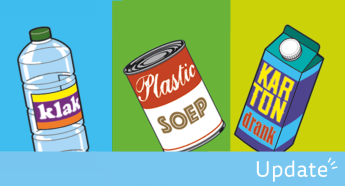Why we need to keep reminding citizens of the dangers of lithium batteries

The recycling industry is sounding the alarm. There are increasing reports of small fires and explosions in sorting centres, recycling plants and waste facilities. The culprits are the highly flammable lithium batteries that end up in a wide variety of waste streams. But the increasing presence of gas cylinders in household waste also worries the industry.
Lithium batteries have become an integral part of our daily lives. They are in your smartphone, laptop and headphones, but equally in your cordless drill or electric toothbrush. Even toys, shoes with lights and musical greeting cards contain a battery. Very handy and nice things all, but unfortunately at the end of their life they increasingly turn up in waste streams where they do not belong at all, such as PMD or paper-cardboard.
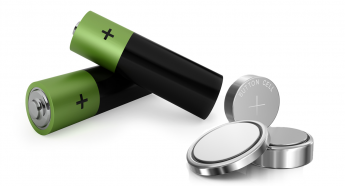
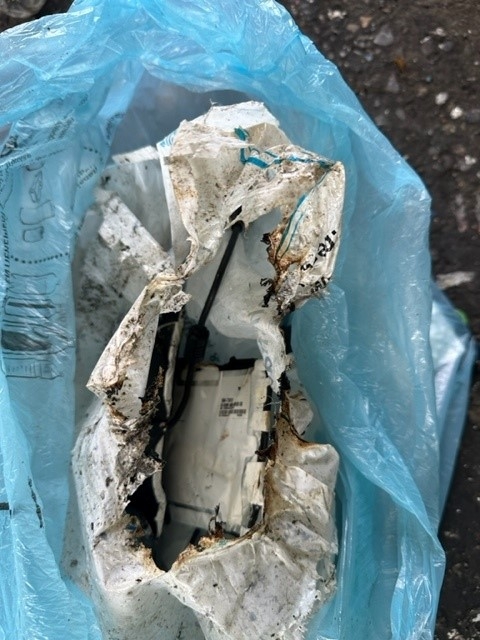
Incidents every day
And this is not without danger. Lithium batteries contain highly reactive materials that can ignite or explode if short-circuited, overheated or damaged. The latter in particular causes problems in the recycling sector. The resulting flash fire can have major consequences in an environment with flammable materials such as plastic and paper. Consequently, not a day goes by without reports of fires in waste installations, collection trucks and collection points. Several incidents have also already been reported at Belgium's PMD sorting centres. These remained without major consequences for the time being, but that things can indeed go wrong was demonstrated just a few years ago when a sorting centre at our northern neighbours burned down completely.
Even while editing this article, we again received images of a PMD bag filled with batteries found in the sorting centre.
Danger to man and machine
Apart from the significant material damage they can cause to plant and materials, fires pose a particularly high danger to the many workers working in our industry. With the further electrification of our society in mind, we expect another explosion of batteries in the coming years. They are also becoming more and more powerful, which only increases the fire risk. High time, therefore, to work towards a sustainable and circular approach.
Urgent action needed
Several players in our sector have already taken the necessary initiatives recently. A recent Bebat video, for instance, makes consumers aware of the batteries hidden in many products. Denuo, the federation of the waste and recycling sector, even devoted an entire seminar to the subject in early November. The industry also advocates tinkering with the design of products so that batteries can be removed easily(er). Products containing lithium batteries should also be clearly marked.
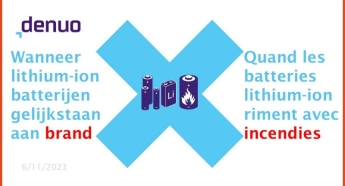
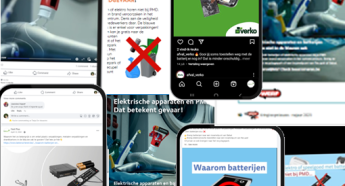
Both Fost Plus and the intermunipal waste companies put efforts in sensitising the citizens.
Raising consumer awareness
In the meantime, it is especially important to make people aware of the risks and urge them to remove batteries and take them to the appropriate collection points. Local governments and intercommunal organisations can play an important role in this, pointing out the dangers in their communications to citizens, or asking collectors to be extra vigilant. But ultimately, a large part of the responsibility remains with the consumer.
Does it really have to come to this? - Copidec sensitises Walloon citizens
Copidec, the umbrella federation of Walloon waste inter-communal associations launched a campaign in early December to raise citizens' awareness of the dangers employees are exposed to in the sorting centre. The accompanying video leaves nothing to the imagination and clearly shows how quickly the fire of igniting batteries spreads...
Extra attention for gas cylinders
Besides batteries, the increasing presence of gas cylinders in various waste streams is also causing increasing problems. Like batteries, they increase the risk of fires and explosions. Fost Plus held extensive consultations with the Interregional Packaging Commission and the various federations in early November to come up with a uniform approach and sorting message for citizens. The next edition of the Update will elaborate further on the planned measures.
What batteries are we talking about?
- Lithium batteries can be found in a wide variety of devices and objects:
- Smartphones, laptops, tablets, game consoles ...
- Earphones, headphones, speakers ...
- Hoovers, drills, toothbrushes ...
- Electric cars, bicycles, scooters, hoverboards ...
- Toys, shoes with lights, musical greeting cards, electronic cigarettes ...
What is the message to citizens?
- Lithium batteries are a major hazard and they are more common than we think.
- Under no circumstances throw batteries in PMD, paper-cardboard or residual waste.
- Remove batteries from old appliances you want to dispose of. Take them to a Bebat collection point.
- Can't remove the batteries? Take the entire appliance to a Recupel collection point.

